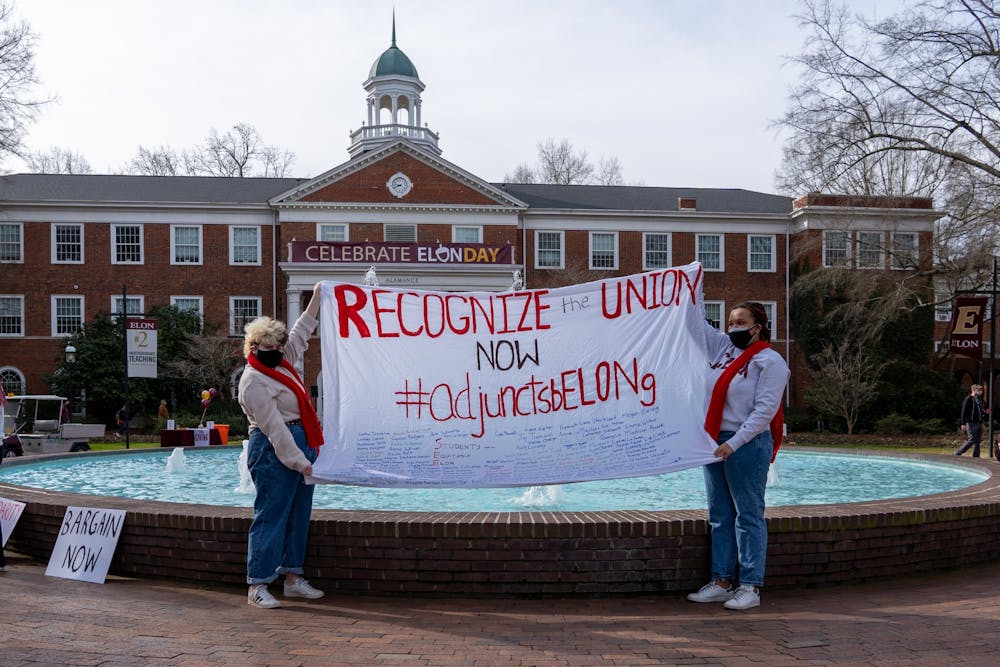When Susan Ladd first arrived at Elon University three years ago, the process of creating the part-time faculty union Elon Faculty Forward was already underway. The instructor in journalism was a lifetime newspaper writer and saw firsthand the importance of unions.
“Coming off the experience of being a longtime newspaper person in North Carolina, I could certainly see the benefits of being part of the union we had because the industry was undergoing such tough times. We have not had a raise at the newspaper for 10 years, maybe, and I'm talking about cost of living,” Ladd said. “That's what happens when you don't have representation.”
That’s why Ladd decided to join Elon Faculty Forward and now is part of the bargaining unit between the faculty union and the Elon University administration. Ladd, along with other part-time instructors in the union, is hopeful that after bargaining this year members of the union will have contracts establishing the terms of employment of part-time, limited term and visiting faculty at Elon for the upcoming semester.
“We're part of the life of the university, and we just want some assurance that we're going to continue to be a part of it,” Ladd said.
Bargaining, or the process of determining terms of employment, can include a number of aspects, according to Elon Law professor Eric Fink. Fink, who teaches employment law and has taught labor law previously, said there are mandatory subjects of bargaining and other terms and conditions of employment.
Ladd and two other part-time faculty members declined to comment on the specific bargaining items because they do not want to disclose bargaining proceedings.
Mandatory subjects of bargaining include wages and hours, which are required to be bargained over if either the union or administration demands. Other terms and conditions of employment, however, can cover much more and are not required to be bargained for. Additionally, the union being in an academic setting makes drawing the distinction between mandatory subjects versus other terms and conditions of employment difficult, Fink said.
Class sizes, course load and opportunities for advancement are all unique to academia and could be considered other terms and conditions. But because class sizes and loads directly impact working conditions of professors, they could be considered a mandatory subject of bargaining.
“Whether it's faculty or for graduate research and teaching assistants, that line between what are academic issues and what are employment issues, or the nature of the job as teachers and professors,” Fink said. “That line is not a clear, bright line, always.”
At the end of bargaining — a process that can take years — the labor union will have a contract of employment. The contract of employment establishes the rights and responsibilities of both the union members and the Elon administration.
One issue that Adjunct Instructor in Music Jim Roberts said he is pleased with the negotiation for is mentoring. Adjunct, part-time, limited term or visiting faculty guidance on mentoring varied from department to department, and often, part-time professors were unable to officially mentor students due to the limited nature of their employment contracts. Mentoring, while it impacts employment, is an issue Fink said could be mandatory or could be part of other terms and conditions.
Heading into the next bargaining sessions, Ladd said she hopes to tackle issues such as job security and longer term contracts, as well as pay. Adjunct Assistant Professor of Art Mark Iwinski said he hopes to also tackle equity and hiring among adjunct faculty at Elon. Roberts said he is looking forward to talking about the financial aspects of the contract.
“There is a culture of downplaying the importance of adjuncts. It's national, this is not just Elon,” Roberts said. “A person that's living from contract to contract, they can't apply for a loan on a house because they can't show employment or guaranteed employment, and there's a lot of things in a person's future that is up in the air because they don't know if they're actually going to be working or not.”
As the union and Elon administration continue to bargain, Iwinski said he hopes administration and the Elon community will come to see the union as a benefit, just as many part-time employees in the union have.
“When you're not even invited to the discussion, then it's really hard to feel included. And in this respect, it's really finding a means by which we're part of the conversation in a meaningful way that adds to the university,” Iwinski said. “It will play to the university's advantage. They may not see it that way yet … they have the possibility of becoming a leader with regard to this kind of thinking.”


